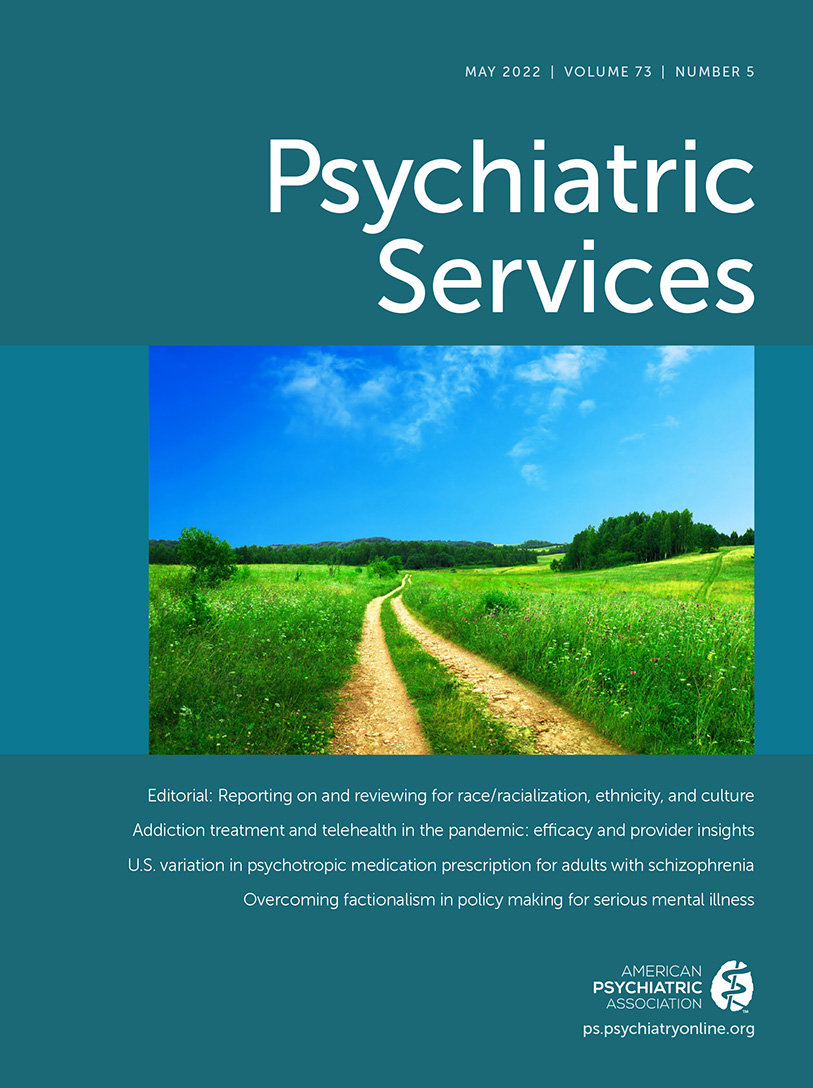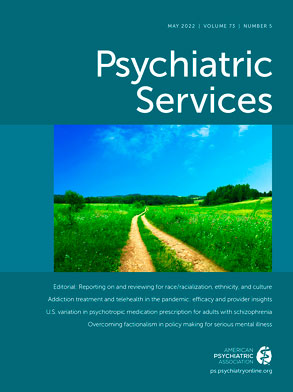Smith and Sisti’s observation in this issue (
1) that policy discussions regarding mental illness often lack sufficient quality is undeniably correct and merits the thoughtful attention the authors give to the causes and opportunities for policy making. Their four recommendations for improving the quality and results of policy discussions regarding serious mental illness offer a good starting point. In particular, their second recommendation, calling for an early focus on identification of areas of consensus, is compelling.
The other areas with which I agree are the importance of including diverse views on mental health and illness and of clarifying areas of disagreement. I also concur with highlighting the immediate need for decriminalization of people with serious mental illness and that their morbidity and mortality rates are unacceptably high. I particularly agree that policy-relevant research has been woefully underfunded and should be expanded. The National Institute of Mental Health (NIMH) commits very little funding to large-scale research on improving current treatments or developing new treatments compared with its funding for basic research. The only large-scale studies funded by NIMH since 2000 have been the Clinical Antipsychotic Trials of Intervention Effectiveness and First Episode Psychosis trials. The Substance and Mental Health Services Administration (SAMHSA) receives funding only for implementation projects but none for new evidence-based treatments or actual implementation science. In the past years, SAMHSA has eliminated funding for important ongoing policy-relevant issues such as the semiannual survey of state mental health systems and for ongoing comprehensive monitoring of utilization of inpatient or overnight treatment for mental illnesses.
In regard to Smith and Sisti’s third recommendation and framework for clarifying areas of disagreement, I offer the following thoughts. According to the
Cambridge English Dictionary (
https://dictionary.cambridge.org/us/dictionary/english/factionalism), factionalism is “a situation in which a group forms within a larger group, especially one with slightly different ideas from the main group”; so it is a direct result of following the authors’ first principle of inclusivity of diverse views on mental health and illness. The disappointing outcomes of our policy deliberations result from a primary focus of these deliberations on one stakeholder group attempting to convince other parties to accept a particular position that the group believes will advance its broader interests. We spend little or no effort seeking to understand the interests, incentives, and constraints of the other stakeholders with which we are deliberating. In policy deliberation, it is more important and effective to seek to understand the other party and its goals than to endeavor to educate the other party about one’s own interests and constraints. Particular mental health policy issues wax and wane; however, we end up deliberating various issues with the same small range of stakeholder groups that the authors are concerned are engaging in factionalism and spend very little time deliberating how to preserve and strengthen our overall relationship with these stakeholder groups (
2). I would therefore recommend seeking to understand the interests, incentives, and constraints of stakeholders that propose policy positions and trying to develop solutions that address their interests and concerns before seeking areas of consensus.
I do not find the notion of “serious mental illness policy” as a separate category useful or historically accurate. Most of the health care and social policies that have been most important and beneficial to persons with serious mental illness have not been specific to serious mental illness. These policies include Social Security Disability Insurance payments, creation of the Medicaid and Medicare programs, mental health parity legislation, protected formularies, and expanded coverage since the passing of the Affordable Care Act. The only specific serious mental illness policies of which I am aware are individual state-based policies defining eligibility for specific Medicaid programs such as the rehabilitation option or home- and community-based waivers and specific state-funded service programs. I believe that seeking to create a specific body of serious mental illness policy would actually increase factionalism within the mental health community and decrease general public support for improving services to persons with mental illness. In addition, considering serious mental illness policy without taking into account substance use disorder and drug control policies neglects a cause of criminalization of persons with serious mental illness that is at least as relevant as the lack of community services for mental illness.
The authors cite a study by Allison et al. (
3), which found that the number of state inpatient psychiatric hospital beds per 100,000 patients decreased from 337.0 in 1955 to 11.7 in 2016, suggesting a significant current shortage of inpatient hospital beds. However, state psychiatric hospitals in 1955 are not comparable to current state psychiatric hospitals. In 1955, state hospital residents were not all persons with serious mental illness, and substantial proportions of the state hospital population included those with dementia, intellectual disability, and “chronic inebriation.” Further, the level of care for most persons in state hospitals in 1955 is not comparable to the level of care in current residential treatment facilities. In 1955, no Centers for Medicare and Medicaid Services funding was available for private psychiatric hospital beds, general hospital psychiatric unit beds, general hospital scatter beds used for psychiatric diagnosis, nursing home beds, or residential treatment. Moreover, compared with the 1955 number of state psychiatric hospital beds, the 2014 number, counting the various bed types—state psychiatric hospital beds, private psychiatric hospital beds, general hospital psychiatric unit beds, scatter beds in general hospitals with a primary admission diagnosis of mental illness, nursing home beds for residents with a primary diagnosis of serious mental illness, and psychiatric residential treatment beds—is 114 per 100,000 population (
4).
The authors call for a presidential commission to focus exclusively on serious mental illness policy reform, but the timing of this call is problematic. The public’s concerns in the areas of mental illness are currently focused on COVID-19–related suicide and trauma. Convening a new commission would take at least 1 year, and 2 years is not enough to have effective deliberations and complete a commission report. The culture of approaching deliberation in an ineffective and disappointing manner is long-standing across multiple stakeholder groups and unlikely to change as a result of a single experience of a more effective deliberation in a 2-year time-limited presidential commission. We need to follow the authors’ excellent example of having deliberations not only about specific policy positions but also about how to strengthen mutual relationships by listening and addressing interests and goals other than our own.
In closing, I want to celebrate two historic deliberative consensuses and recent successes for mental health policy. Congress unanimously passed the bipartisan National Suicide Hotline Designation Act of 2020, which created 988 as the universal phone number for the National Suicide Prevention and Mental Health Crisis line. The rules require phone service providers to direct all 988 calls to the existing National Suicide Prevention Lifeline by July 16, 2022. Congress authorized states to pass user fees on telephone lines—the same source that is used to fund 911 emergency services (
5).
Section 223 of the Protecting Access to Medicare Act of 2014 authorized the Certified Community Behavioral Health Clinic (CCBHC) demonstration, which aims to improve the availability, accessibility, quality, and outcomes of outpatient mental health and substance use services by establishing a standard definition and criteria for CCBHCs and prospective payment systems that provide adequate financial support for clinics in providing comprehensive services to all treatment-seeking individuals. As of this writing, Congress has invested >$1.97 billion in CCBHC grants, and >430 CCBHCs operate now in 42 states, the District of Columbia, and Guam (
6).

